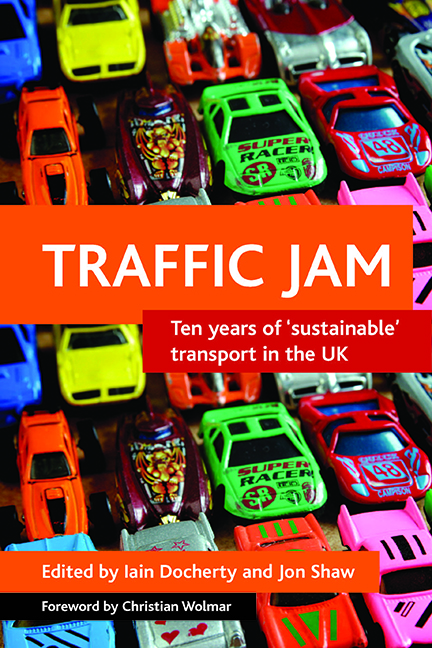Book contents
- Frontmatter
- Dedication
- Contents
- List of tables, figures and boxes
- Foreword
- Preface and acknowledgements
- List of acronyms
- Notes on contributors
- Part One Policy and politics
- Part Two Progress in policy implementation
- Part Three Ten years since A new deal for transport – signposts to the UK’s transport future?
- Index
one - New deal or no new deal? A decade of ‘sustainable’ transport in the UK
Published online by Cambridge University Press: 21 January 2022
- Frontmatter
- Dedication
- Contents
- List of tables, figures and boxes
- Foreword
- Preface and acknowledgements
- List of acronyms
- Notes on contributors
- Part One Policy and politics
- Part Two Progress in policy implementation
- Part Three Ten years since A new deal for transport – signposts to the UK’s transport future?
- Index
Summary
The Blair government's New deal for transport (DETR, 1998a) was born in a wave of optimism in the 1990s. The New Deal moniker was in fact employed by New Labour across a range of policy areas to demonstrate the return of proactive state intervention and social conscience to politics after 17 years of neoliberal-inspired marketisation under the Conservatives (Giddens, 2000). It was not exactly Keynesian in character, however, emphasising the virtues of a ‘Third Way’ arguably closer to Milton Friedman than either Keynes or J. K. Galbraith, Friedman's celebrated intellectual opponents. Indeed, although the New Deal programmes were – like Franklin Delano Roosevelt's original in depression-era America – billed as a radical departure from previous practice, in reality much of this departure was rhetorical in that many of the market-based elements of previous Conservative Party policies were retained. One defining characteristic of the New Deal for Transport, though, was its overt emphasis on sustainability, in the broadest sense. Motorised transport has been the bearer of huge economic and social benefit. It has literally driven the generation of wealth and provided countless opportunities for people to improve their life chances. It has also long been known that there are drawbacks with the way in which transport systems have developed: people are injured and killed in road traffic accidents, the air along busy streets does not smell very nice, waiting in traffic jams can be rather tiresome, and so on. But it is only within the relatively recent past that the scale of transport's real impacts has been anything like properly appreciated (and we are still learning); we now realise that the ways in which and how much we travel are capable of causing appreciable harm to entire populations. They can constrain economic development because congestion is not just irritating but also extremely expensive to businesses and individuals (Eddington, 2006); they can kill people not just by running them over but also by making them fat and unhealthy (Sloman, 2006); and they are not just bad for local air quality, they are also major contributors to global warming (Chapman, 2007).
The Stern Review (Stern, 2006) makes clear that the costs of global warming to the world economy could be catastrophic if nothing is done to arrest increasing carbon emissions, and perhaps its most significant contribution is laying to rest the idea that societies can only be ‘rich and dirty’ or ‘green and poor’.
- Type
- Chapter
- Information
- Traffic JamTen Years of 'Sustainable' Transport in the UK, pp. 3 - 28Publisher: Bristol University PressPrint publication year: 2008

